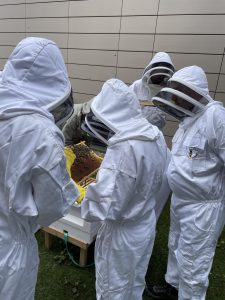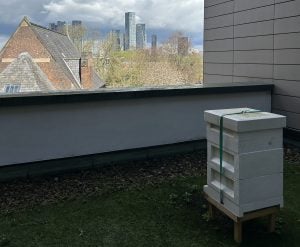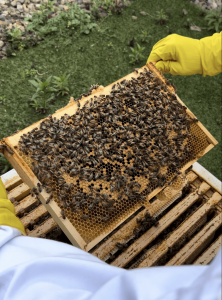Over the last year, Loreto College has been working to establish an apiary on the campus. This initiative not only enriches the campus environment but also offers significant educational benefits while contributing to the conservation of bees, a species facing numerous challenges.
The Benefits of Keeping Bees
Bees are vital to our ecosystem, primarily due to their role in pollination. They are responsible for pollinating approximately 70% of the crops that feed 90% of the world. By establishing an apiary, Loreto College can contribute to local biodiversity and the health of surrounding flora. The presence of bees can enhance the growth of flowering plants, fruits, and vegetables on and around the campus, creating a more vibrant and sustainable environment.
Moreover, honeybees produce honey, beeswax, and other products like propolis and royal jelly, which have various uses in food, cosmetics, and medicine. These products will be utilised within the college community, offering a unique touch to campus life, and fingers crossed, watch this space for Loreto Honey.
- Loreto College’s Bee Team
- Perfect spot for a hive
- Loreto really is buzzin!
The Struggles Bees Face
In recent years, bees have faced numerous challenges that have led to a significant decline in their populations. These challenges include habitat loss, pesticide exposure, climate change, and diseases. This decline is alarming given the essential role bees play in pollination and maintaining healthy ecosystems.
Habitat loss due to urbanization and agricultural expansion reduces the availability of foraging plants and nesting sites. Pesticides, particularly neonicotinoids, have been shown to harm bees’ navigation systems, making it difficult for them to find food and return to their hives. Climate change affects the availability of floral resources and can disrupt the synchrony between bees and the plants they pollinate. Additionally, diseases and parasites, like the varroa mite, can devastate bee colonies. By establishing an apiary, Loreto College can contribute to the conservation efforts needed to protect bees.
Educational Opportunities
We hope that an apiary at Loreto will provide an outstanding hands-on learning experience for students across various disciplines. For example:
Business and Marketing: Students in business courses can explore product development and marketing strategies by creating and promoting products derived from the apiary, such as honey and beeswax candles.
Art and Humanities: Bees and beekeeping can inspire art projects, writing assignments, and discussions about the historical and cultural significance of bees.
Biology and Environmental Science: Students can study bee behaviour, ecology, the crucial role of pollinators in ecosystems, and the effects of climate change on bee colonies.
Understanding the Hive Hierarchy
A typical honeybee hive consists of three types of bees: the queen, worker bees, and drones, each playing a specific role:
Queen Bee: The queen bee is the only reproductive female in the hive and is responsible for laying all the eggs. She can lay up to 2,000 eggs per day during peak season. The queen also produces pheromones that regulate hive behaviour and maintain social harmony.
Worker Bees: These are non-reproductive females and comprise most of the hive population, typically numbering between 20,000 to 60,000 bees during the active season. Worker bees have various duties based on their age, including cleaning the hive, feeding the queen and larvae, producing wax, foraging for nectar and pollen, and guarding the hive.
Drones: Male bees whose primary role is to mate with a virgin queen. Drones do not have stingers and are generally fewer in number compared to worker bees. After mating, drones die, and those that do not mate are often expelled from the hive before winter.
The establishment of an apiary at Loreto College offers a multifaceted opportunity to enhance the educational experience, support local biodiversity, and contribute to the conservation of bees. This initiative will not only benefit the college community but also set a positive example of environmental stewardship. By understanding and addressing the challenges bees face, Loreto College can play a crucial role in ensuring these indispensable pollinators thrive for generations to come.


